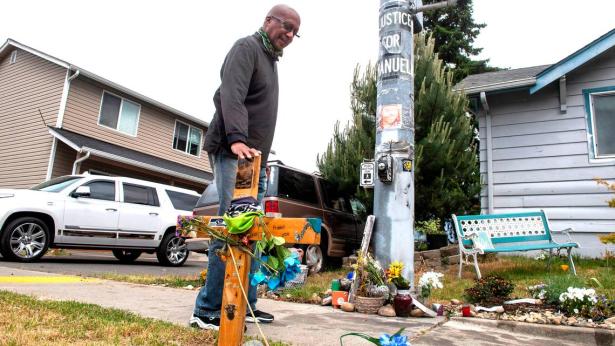“We should ask ourselves, what step do we want to take to begin to move in a different way? Make certain that your life and your energy are engaged in the task of resisting the venom in our society with a quiet no.” — James M. Lawson, Jr.
The torture and murder of a young Black man named Tyre Nichols by a gang of five Memphis police officers, caught on camera, outraged the nation. The fact that it was Black people who brutalized Tyre and did nothing to save him added yet another level of outrage. How could this happen? What is going on in Memphis?
Black journalist and historian Otis Sanford at the University of Memphis put it this way: “We are in trauma.” The trauma of Memphis is our trauma too. Police violence haunts America. Tacoma police, now charged with murder, killed young Manual Ellis by holding him face-down on the pavement, the same way police killed George Floyd in Minneapolis. As in Memphis, racially impacted poverty, crime, and homelessness play out every day on our streets. America’s trauma of socioeconomic dislocation, racial terror and gun violence affects us all.
In Memphis, the existence of racial terror and trauma goes back as far as history can remember. Back to stolen lands of indigenous people and the stolen lives of African slaves. Back to deadly white race riots after the Civil War, to the burning and dismemberment of young Ell Persons in a mass lynching in 1917, to police brutalization of labor and civil rights advocates in the 1930s, to the police murder of teenager Larry Payne in 1968. The list of racial terror goes on and on. This is not to mention the gun violence that took Martin Luther King’s life during the Memphis sanitation strike.
I was an activist in Memphis in the aftermath of King’s death, when over a dozen white police beat to death young Elton Hayes in 1971 after a car chase. We got a law passed that banned police use of deadly force except to save someone’s life and when no other means were possible. Later, the city integrated its police force, which is now 58 percent Black. But that was not enough. Policing is itself a problem, and whoever wears that blue uniform can still save you or kill you.
In social justice movements, we tried to implement King’s demands for adequate income, health care, housing, and education for all. Instead, we got police militarization and mass incarceration. Spurred by the pandemic and the violence of the Trump era, America’s history of racial terror, and our resistance to it, has only accelerated. Republicans who want to ignore this history or even ban us from teaching about it can only add to our society’s trauma.
History shows that we as a people can successfully resist America’s racial trauma. Through struggle, we have made great gains. It is not for nothing that people sacrificed to gain voting rights and some measure of equality. In our current time of horrors, can we still have hope for change?
Rev. James Lawson says yes. As a preacher and a practical organizer, he helped fuel the fires of the civil rights movement, the Memphis strike, and the powerful, multicultural labor movement in Los Angeles where he lives today. At 93, Lawson doesn’t give up.
Lawson knows what works to bring about change and what doesn’t. In 2008, the University of Washington brought him to our Tacoma campus and several Hilltop churches. We turned his talks into a film called “Love and Solidarity,” and now into his new book, “Revolutionary Nonviolence: Organizing for Freedom.” In it, Lawson declares, “Violence has not produced justice anywhere. In a culture of violence, when we have been weaned on violence, can I suggest another power that is greater than violence?”
The alternative Lawson spells out is nonviolent direct action, which he has taught for many years. You can practice it one-on-one, in your church, your school, your union, your workplace, for yourself and your community.
In Black religious traditions going back to slavery, hope has provided our best response to trauma. The family of Tyre Nichols called on us to not give up on hope. In that vein, Lawson writes, “We should ask ourselves, what step do we want to take to begin to move in a different way?” His answer: “Every single one of us must become a center of resistance to the directions our country is going to the chaos… Each one of us must become a resister.” Lawson says one can hope to become “engaged with all of your might to be a person of compassion and truth who stands with all humanity.”
“In this moment,” Lawson writes, “we need to understand nonviolence more than ever.”
We must overcome efforts to ban our history, and we can reinvigorate our struggles to build even greater social justice movements. In the human family, hope springs eternal.
Nothing is guaranteed, Lawson tells us, but it is possible that yes, we can overcome.
[Michael Honey, Emeritus Professor at the University of Washington Tacoma, is a labor and civil rights and Martin Luther King scholar. His most recent work includes Revolutionary Nonviolence, Organizing for Freedom, by James M. Lawson, with Michael Honey and Kent Wong, with Forward by Angela Davis, (University of California Press, 2022).]


Spread the word